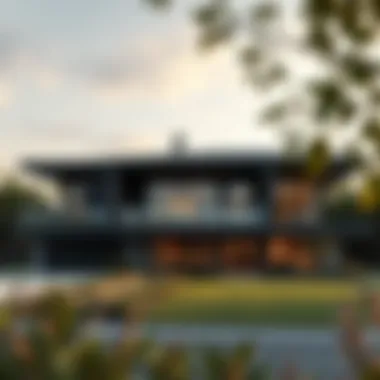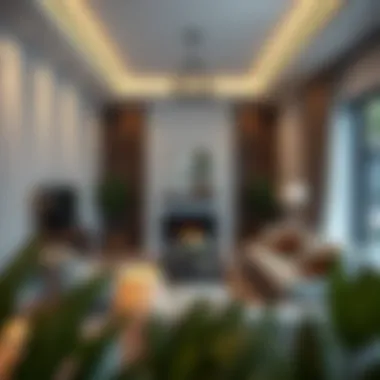The Nuances of Turnkey Houses Explained


Intro
The real estate market has been evolving at an astonishing pace, and among its many offerings, turnkey houses stand out as an enticing option for a variety of buyers. But what exactly qualifies a property as turnkey? Essentially, these homes are move-in ready, meaning that all renovations and repairs have already been made, allowing buyers to settle in without a fuss. This feature presents a unique mix of convenience and potential savings, dovetailing perfectly with today's fast-paced lifestyle.
As we explore this subject, we will dig deeper into the nitty-gritty details surrounding turnkey houses. It goes beyond just the aesthetic appeal of a property; it taps into practical financing, market trends, and the myriad considerations that could come into play when thinking about purchasing such a home. In doing so, we aim to equip both potential investors and home buyers with the essential knowledge to make informed decisions.
The Allure of Turnkey Homes
There’s a certain charm to finding a home that’s ready for you right off the bat. Many buyers today are looking for properties that save them the hassle of renovations. They want a space that reflects their style but also meets their practicality needs without a boatload of work involved. With basis in this trend, turnkey houses are grabbing more attention.
It’s more than just a roof over your head; it’s about being part of a more expansive lifestyle choice. Whether you seek a luxury home, a cozy retreat, or something uniquely stylish, turnkey homes have something for everyone. By diving into the subsequent sections, we will illuminate the defining characteristics, benefits, and challenges, as well as provide insight into market dynamics that shape this niche of real estate.
Defining Turnkey Houses
Understanding what turnkey houses are is the first step for anyone looking to invest or buy in today’s real estate market. The term is often tossed around, but its implications are significant. A turnkey home is essentially a property that is ready to be occupied without any immediate repairs or renovations required. This means that the buyer can simply turn the key and step into their new home—hence the name.
Characteristics of Turnkey Properties
Turnkey properties generally boast several notable characteristics:
- Move-in Ready: These homes are prepared for occupancy, often showcasing modern finishes and full-sized appliances. Buyers can frequently anticipate having everything they need right there upon move-in.
- Minimal Work Required: Unlike fixer-uppers, turnkey properties need little to no renovation work. Many buyers find it appealing to avoid the stress and time commitment associated with major renovations.
- Established Neighborhoods: Many turnkey homes are located in well-developed areas, providing easier access to local amenities such as schools, parks, and shopping centers.
"Turnkey living means you can focus on settling in rather than dealing with a parade of repairs."
Types of Turnkey Homes
There are various categories of turnkey homes, each tailored to different buyer needs:
- Newly Built Turnkey: These are brand new constructions that comply with modern building codes and often come with warranties. They are typically designed with contemporary features in mind.
- Renovated Turnkey: Older homes that have undergone significant renovations also fit this category. They maintain their traditional charm while being updated with modern facilities.
- Investment Turnkey: For those looking to invest, there are properties available already rented out, providing immediate income potential without the headaches of tenant placement.
Distinction from Traditional Homes
While traditional homes may require extensive renovations or updates, turnkey properties stand out due to their immediate occupancy status. This distinction is pivotal: traditional homes often have character and history, yet they demand time and investment to reach a livable condition. In contrast, turnkey options allow new owners to bypass the grunt work and enjoy their space with less hassle.
In summary, defining turnkey houses opens a window into a simplified purchasing experience in real estate. The characteristics of such properties, alongside their various types, make them appealing for different buyer demographics. Furthermore, comprehending the distinction from traditional homes emphasizes the convenience and practicality associated with turnkey living, enhancing its attractiveness in today’s market.
Advantages of Turnkey Houses
Turnkey houses stand out in the real estate landscape, capturing the attention of both buyers and investors alike. The allure of these properties rests in their convenience and efficiency, which can greatly simplify the home-buying process. For those sitting on the fence about purchasing a home, understanding the advantages of turnkey houses might just tip the scales in favor of a smarter investment.
Immediate Occupancy
One of the standout benefits of turnkey homes is the immediate occupancy they offer. Unlike traditional homes that often come with a laundry list of repairs, renovations, and touch-ups, a turnkey house is ready to move in from day one. This can be particularly appealing for busy professionals or families who don’t have the luxury of time to dedicate to fixing up a property.
Especially in fast-paced industries or during transitional life phases, having a place that’s move-in ready can mean less stress. Imagine buying a home on a Friday and hosting a gathering that same weekend. This instant access not only provides comfort but also flexibility in terms of lifestyle adjustments.
Lower Renovation Risks
Choosing a turnkey property typically means lesser renovation risks. When you walk into a turnkey house, you're essentially getting a product that comes fully assembled. This reduces the chances of underestimating costs or uncovering hidden issues that can escalate expenses. For instance, in an old home, you might find plumbing issues lurking behind walls or electrical systems that don't quite meet modern standards.
With a turnkey house, reputable builders and sellers ensure that the property meets current codes and standards. Besides, the renovations—if necessary—are usually completed to a higher quality. As a buyer, you can have peace of mind knowing that many of these homes often come with warranties, further safeguarding your investment.
Potential Cost Savings
Turnkey houses can also be a boon for your wallet. While the initial purchase price might seem higher than other options, the long-term financial benefits can outweigh these costs. Potential homeowners might find themselves saving money in various ways.
- No Immediate Renovation Costs: Moving into a home that requires no updates allows for budgeting toward other areas of home ownership.
- Lower Utility Bills: Newer properties typically have better insulation and modern appliances, which can lead to lower bills right off the bat.
- Market Value Retention: Turnkey homes often maintain their value better than fixer-uppers, especially in competitive markets. Having an appealing, ready-to-live-in property can help it appreciate in value faster.
"It’s about working smarter, not harder—especially when it comes to real estate!"
Considerations for Buyers
When considering a turnkey house, it’s crucial to approach the decision-making process with informed scrutiny. Unlike traditional homes, turnkey properties are marketed as ready for immediate habitation. However, this doesn’t mean all that glitters is gold. Buyers must delve deeper to understand the various aspects that contribute to the property's true value. This section outlines key considerations that can prevent a misstep in the purchase journey.
Evaluating Property Quality
Before signing on the dotted line, evaluating the actual quality of the property should be paramount. One might be tempted to rely on glossy photos and staged interiors, but a critical eye can reveal much more. Check the materials used in construction and finishes. Are they of high quality, or are they simply superficially appealing? Sometimes, a fresh coat of paint can conceal serious issues underneath. Look for signs of structural integrity; small cracks in the walls, uneven flooring, or doors that don’t fit quite right can signal potential headaches down the line.


It's wise to also consider the functionality of the home. Does it have enough storage space? Are the layouts practical? Walk-throughs should ideally happen multiple times at different times of the day to see the property in varying lights. Seems common, but often skipped; this step can reveal multiple aspects that affect your comfort and satisfaction in daily living.
Understanding Local Market Dynamics
The location of a turnkey home often dictates its long-term value and appeal. Understanding the local market can be trickier than one would think. Trends can vary; what’s hot in one neighborhood might be a dud in another. For instance, is the area experiencing growth, or are there signs of decline? Researching the average home prices, rental yields, and community plans can provide the insight needed.
It helps to tap into local real estate forums or community groups on platforms like reddit.com. Local insights from potential neighbors or community forums can reveal unlisted factors that could influence your investment.
In addition to that, consider the neighborhood amenities. Access to schools, parks, shopping, and public transport can enhance the quality of life significantly, making the property more desirable in the long run.
Legal and Financial Implications
When navigating the realm of turnkey homes, disregarding the legal and financial aspects can cost buyers heavily. Start by ensuring that the home has a clear title; any liens or disputes need to be addressed before making a purchase. The last thing you want is to inherit someone else’s legal baggage.
Moreover, understanding the financial implications cannot be overstated. Turnkey homes can come with hidden costs such as HOA fees or property maintenance responsibilities that could strain your budget. Planning and budgeting should include potential costs outside of the purchase price; repairs and upgrades, while usually unforeseen, can become necessary expenses.
"Investing in real estate is not just about buying property; it’s about ensuring financial health and investment safety."
Consider consulting with a real estate attorney or a financial advisor to help navigate the complexities of property investment. Their expertise can shed light on financial pitfalls you might overlook.
By weighing these key considerations, potential buyers can position themselves to make informed and advantageous decisions regarding their investment in turnkey housing.
Navigating the Purchase Process
Navigating the purchase process of a turnkey house is central to understanding the dynamics of this unique type of real estate investment. This process can be the make-or-break point for buyers. Understanding what steps to take can save time, money, and potential headaches down the line. Each stage focuses on critical aspects that contribute to a successful acquisition, emphasizing the need for diligence and informed decision-making.
Finding the Right Property
Finding the right property is like searching for a needle in a haystack; the options are aplenty, making it crucial to narrow down the search based on specific criteria. Buyers should consider their lifestyle, needs, and budget before embarking on this journey.
Location is Key:
The property’s location will shape its value. Proximity to schools, parks, and transportation can significantly impact resale. In addition, a neighborhood's character plays a role in whether a buyer feels at home right away.
Assessing Features:
Aside from location, understanding the features that come with a turnkey home can make a difference. These properties often include modern appliances, updated layouts, and fresh finishes. A checklist can help streamline this process, including:
- Number of bedrooms and bathrooms
- Size of the property
- Backyard space or additional lot potential
- Parking facilities
Once you've got a good idea of what you're looking for, the next step is visiting properties to gauge how they align with your vision.
Conducting Due Diligence
Conducting due diligence is non-negotiable when navigating the purchase process. This thorough investigation provides a clearer picture of the property’s condition and the surrounding area.
Inspecting the Home:
A qualified inspector should assess the home to find any hidden issues. Pay attention to elements that are expensive to repair, like the roof or plumbing. It's better to know upfront if the walls have structural concerns rather than after they've made a lovely living room.
Checking Documentation:
Reviewing the documentation is equally important. This should include property title, permits for renovation work, and any homeowner association rules. Knowing what you're stepping into can save a lot of trouble down the road.
"A thorough inspection can shine a light on dark corners that might otherwise lead to unpleasant surprises down the line."
Financing Options: An Overview
Understanding financing options is essential for any prospective buyer. Not all turnkey homes come with the same price tag, and having a budget in mind will steer your decisions in a sensible direction.
Mortgage Choices:
Traditional mortgages are the most common route. However, know it’s not just about interest rates. Explore fixed-rate versus adjustable-rate mortgages, or government-backed loans like FHA or VA loans, that might provide additional advantages for qualifying buyers.
Getting Pre-Approved:
Before making offers on property, securing pre-approval for a mortgage can put buyers in a stronger negotiating position. Sellers often take offers seriously that come with an assurance from a lender.
Budgeting for Extra Costs:
Beyond the purchase price, additional costs can pile up. Don't overlook:


- Closing costs
- Inspection fees
- Property taxes
- Homeowners insurance
By having a financial plan, you optimize the chances that your new turnkey home will fit neatly within your economic landscape.
Navigating the purchase process demands careful thought and planning but can be rewarding. With diligence and strategic decision-making, buyers can find satisfying properties that remain financially sound investments.
Financing a Turnkey Home
Understanding how to finance a turnkey home is crucial for potential buyers before they get their feet wet in the property market. Unlike more conventional homes, turnkey properties offer fewer hurdles since they are move-in ready. However, financing can still present challenges that one should navigate carefully. From exploring mortgage options to budgeting for additional costs, getting a grasp on financing not only helps in avoiding surprises later but can also empower buyers to make more informed decisions.
Understanding Mortgage Options
When it comes to financing a turnkey home, knowing the types of mortgage options available can be the difference between a smooth sailing or bumpy ride during the buying process. The typical options include:
- Conventional Loans: These loans are not backed by the government. They often require a higher credit score and may necessitate a down payment of 20%. Still, they can be quite favorable if you can meet the terms.
- FHA Loans: These loans are insured by the Federal Housing Administration and designed for low to moderate-income borrowers. They often require a lower down payment, usually around 3.5%, making them accessible for many first-time homebuyers.
- VA Loans: Aimed at veterans and active military personnel, VA loans allow buyers to purchase homes without a down payment, often with lower interest rates. However, eligibility criteria must be met.
- Jumbo Loans: If you're eyeing a pricier turnkey home that exceeds the conforming loan limits, a jumbo loan may be the ticket—even though they come with stricter requirements.
Each of these options carries its pros and cons, and understanding your financial situation can help you make the right choice. Getting pre-approved can also provide a clearer picture of what falls within your budget and how much lender financing you can secure.
Budgeting for Additional Costs
While the purchase price is often the first thing that springs to mind when buying a home, there are additional costs that one cannot overlook. Proper budgeting can make the difference between finding joy in a new home and feeling overwhelmed by unexpected expenses.
- Closing Costs: Typically, this can range from 2% to 5% of the loan amount and includes fees for services such as title insurance and loan origination. Knowledge of these fees can help you build a more accurate budget.
- Homeowners Insurance: Protecting your new property is vital. Insurance premiums can vary widely depending on various factors, including location and property value, so plan accordingly.
- Property Taxes: These are often included in the monthly mortgage payments but can fluctuate. Knowing the average rates in your intended area helps prevent any shock down the line.
- Homeowners Association (HOA) Fees: If the property is part of a community with shared amenities, you may be subject to monthly or annual HOA fees. Check if these could impact your overall budget.
By keeping these additional costs in mind, buyers can avoid the pitfall of stretching their finances too thin. It's essential to do a bit of homework beforehand and allocate sufficient funds for all expenses associated with buying a turnkey home. This knowledge helps shore up finances and provides peace of mind as you dive into the real estate journey.
Challenges with Turnkey Properties
Navigating the world of turnkey houses can seem like a walk in the park, but there are a few potholes that potential buyers should be aware of. While these properties offer immediate occupancy and attract many buyers, the reality is that they can come with their own set of challenges. Addressing these challenges is crucial in helping buyers make informed decisions, ultimately leading to more satisfying purchases and investments.
Market Saturation Risks
The allure of turnkey homes often brings a wave of buyers chasing after them. This creates a scenario where the market can become saturated quite quickly. When too many similar properties flood the market, prices can drop faster than a hot potato. This saturation makes it difficult for homeowners to get a decent resale value, which could lead to a frustrating experience when they decide to sell.
Signs of market saturation might show up as prolonged listing periods and reduced demand for new turnkey properties. Buyers could find themselves in a pickle—having invested their life savings in a property that may seem less appealing as time goes on. It’s essential to keep an eye on local market trends and assess the demand against available inventory. A well-informed buyer will also conduct thorough market research to understand the current selling landscape.
"The best time to plant a tree was 20 years ago; the second-best time is now." – Chinese Proverb
Hidden Maintenance Issues
A shiny, new turnkey home may not stay that way forever. While these properties are marketed as move-in ready, there can be lurking maintenance issues that might surprise unsuspecting buyers. Often, a fresh paint job can hide serious problems lurking beneath the surface, so it's critical for buyers to be thoroughly vigilant.
How can you avoid stepping into this trap? Here are a few practical strategies:
- Hire a professional inspector: Before signing on the dotted line, have a qualified inspector examine the property, looking for plumbing, electrical, and structural issues that could pose problems later.
- Check warranties: Many turnkey homes offer warranties on appliances and construction. Understanding what is covered can help you sidestep unexpected costs.
- Review the history: Past maintenance records can provide insight into how well the property has been cared for. Catching issues early means avoiding larger expenses down the road.
Renovation and Upgrades
Renovation and upgrades play a pivotal role in the narrative of turnkey houses. While these properties are typically marketed as ready for immediate occupancy, the reality often holds nuanced layers that necessitate thoughtful evaluations and adaptations. Upgrades are not merely about enhancing aesthetics; they can significantly impact functionality, energy efficiency, and long-term value. Furthermore, understanding when and how to approach renovations not only preserves a property’s allure but also safeguards investments.
It's essential to recognize that each property comes with its own history and quirks that may require adjustment or enhancement. As such, embarking on renovation projects can be a practical response to changes in lifestyles, shifts in market demands, or technological advancements.
When Upgrades are Necessary
Scattered across turnkey homes are distinctive features that may not always align with the buyer’s vision. These disparities often explain why upgrades become not just desirable but crucial. Here are some situations that call for immediate renovations:
- Outdated Interior Design: A property built even a few years back may showcase styles that no longer resonate with current trends. Functional kitchens and inviting living spaces often replace heavy drapes and stark color palettes.
- Energy Efficiency Needs: Older properties might not adhere to today’s energy standards. Additions like better insulation or upgraded windows can round off energy bills while enhancing comfort.
- Growing Family Dynamics: A couple may find their snug two-bedroom house feeling cramped as their family expands. Sometimes, the addition of extra space—be it a cozy nook or a larger kitchen—becomes essential.
- Accessibility Requirements: As life unfolds, accessibility needs can change. Upgrading entryways or widening doors can transform a home into a friendly space for all who enter.


Recognizing these moments can be pivotal and guide homeowners in making informed decisions that can help keep their property relevant and appealing.
Cost-effective Renovation Strategies
While big renovations might seem like a hefty investment, there are various cost-effective strategies that can not only minimize financial strain but also provide a good bang for the buck. Here are some smart avenues to explore:
- DIY Projects: Small fixtures like light fixtures or cabinet handles can be swapped out without hiring professionals. Investing time can save a good chunk of change.
- Open Space Concepts: Removing non-structural walls can drastically change a home’s feel without the extensive costs associated with complete overhauls.
- Focus on Curb Appeal: Sometimes, a fresh coat of paint or a revamped landscape can do wonders in catching potential buyers’ eyes without major spending.
- Utilizing Online Resources: Platforms such as Reddit provide firsthand accounts and tips from fellow renovators. Poring through discussion threads can lead to unexpected insights that save funds and effort.
"A property isn’t just a house; it’s a canvas waiting for the owner's story."
Market Trends in Turnkey Housing
Understanding the currents of the turnkey housing market is crucial for buyers and investors alike. The landscape of real estate is continuously evolving, influenced by economic shifts, demographic trends, and consumer preferences. This section aims to unravel the intricacies of the current market dynamics, offering crucial insights that can aid potential buyers in their decision-making processes. It’s not just about identifying a house; it’s understanding the contours of the market it sits within.
Current Demand and Supply Analysis
In the realm of turnkey homes, demand typically hinges on the prevailing economic climate and housing trends. Recent years have shown strong interest in these properties as they offer immediate relief from the hassle of renovations. With more people looking to streamline their home-buying process, the surge in demand is palpable. Reports suggest that first-time buyers and young professionals are especially drawn to turnkey options, as they often lack the time or resources to engage in extensive home makeovers.
However, while demand is on the rise, the supply of quality turnkey houses can sometimes lag behind. This imbalance creates a robust competition among buyers, driving prices up.
- Major factors influencing this demand include:
- Economic stability, which increases buyer confidence.
- The rise of remote work, prompting relocations and a search for ready-to-move-in properties.
On the supply side, builders are responding to this demand, yet they often face challenges such as rising construction costs and permit delays. This can result in fewer properties entering the market, further exacerbating the competition.
"In that intense market, finding a quality turnkey home is like searching for a needle in a haystack."
Future Projections for Turnkey Real Estate
Looking ahead, several trends suggest how the turnkey housing market may evolve. Analysts forecast continued increases in demand due to several factors, including demographic shifts such as the aging population that often seeks downsized, low-maintenance living options. Young families, too, will likely remain in search of convenient housing solutions, solidifying the position of turnkey homes as a preferred choice.
Moreover, technological advancements are anticipated to influence the market positively. The rise of virtual tours and online transactions is making the home buying process easier and more accessible, aligning perfectly with the turnkey concept that focuses on convenience and speed.
- Key trends to watch for include:
- Increased investment in sustainable construction methods, as buyers become more environmentally conscious.
- A potential rise in properties designed with multifunctional spaces, catering more to work-from-home dynamics.
The projected growth in the turnkey market paints a hopeful picture for investors and buyers alike. However, attention must be paid to local market conditions, as these trends vary regionally. Keeping tabs on these elements gives buyers a leg up when navigating their options.
Epilogue on Turnkey Houses
The conclusion about turnkey houses ties together various insights about this unique segment of the real estate market. Turnkey properties present a promising avenue for potential homeowners and investors, inviting them to consider the practical benefits that come with this type of investment. These homes allow buyers quick entry into the market, with minimal renovations or preparations required. The appeal lies not only in their immediate availability but also in the satisfaction of finding a place that’s ready to live in without the hassle of undertaking a series of renovations.
Balancing Pros and Cons
As with any investment, buying a turnkey home comes with its fair share of advantages and disadvantages that must be weighed carefully. On one hand, the biggest draw is immediacy. When you purchase a turnkey property, you can often move in right away, which is a fantastic relief in fast-paced markets where housing options dry up quickly.
However, on the flip side, you could find yourself shelling out more than you anticipated, especially if the property is priced for its present aesthetic and not for its potential future value. A stable but inflated price tag might tempt some but could really limit your options long-term. Moreover, since many turnkey homes are relatively new or recently renovated, they might not carry the charm or character of older homes. It's crucial for buyers to gauge the emotional trade-off of turning away from historical properties enriched with character.
Remember, a home is not just about money but about memories and experiences too. This balancing act requires buyers to sift through emotional pulls and financial realities, often leading to second-guessing whether they made the right choice as soon as the ink dries on the contract.
Making Informed Decisions
In the end, the objective when approaching the idea of buying a turnkey house should always be about making informed decisions. This means diving deep into researching not just properties but also understanding associated costs and market conditions. Gathering as much intel as possible can pay huge dividends.
You might consider consulting with local real estate experts who can navigate the nuances of your desired area. Investigating zoning laws, and community amenities can further aid your decision. Regardless of your emotional attachment to a property, practical considerations typically weigh more heavily than whimsy goals.
Furthermore, it doesn't hurt to outline your priorities. Ask yourself essential questions such as: What’s my budget? Am I planning to stay for years to come? Do I want the flexibility to remodel down the line? These questions help frame your decisions more rationally.
"Knowledge is power, and in the realm of real estate, it can mean the difference between a dream home and a costly mistake."
Ultimately, a balanced view of the pros and cons coupled with thorough market insight lays a solid foundation for wise investments in turnkey homes.



